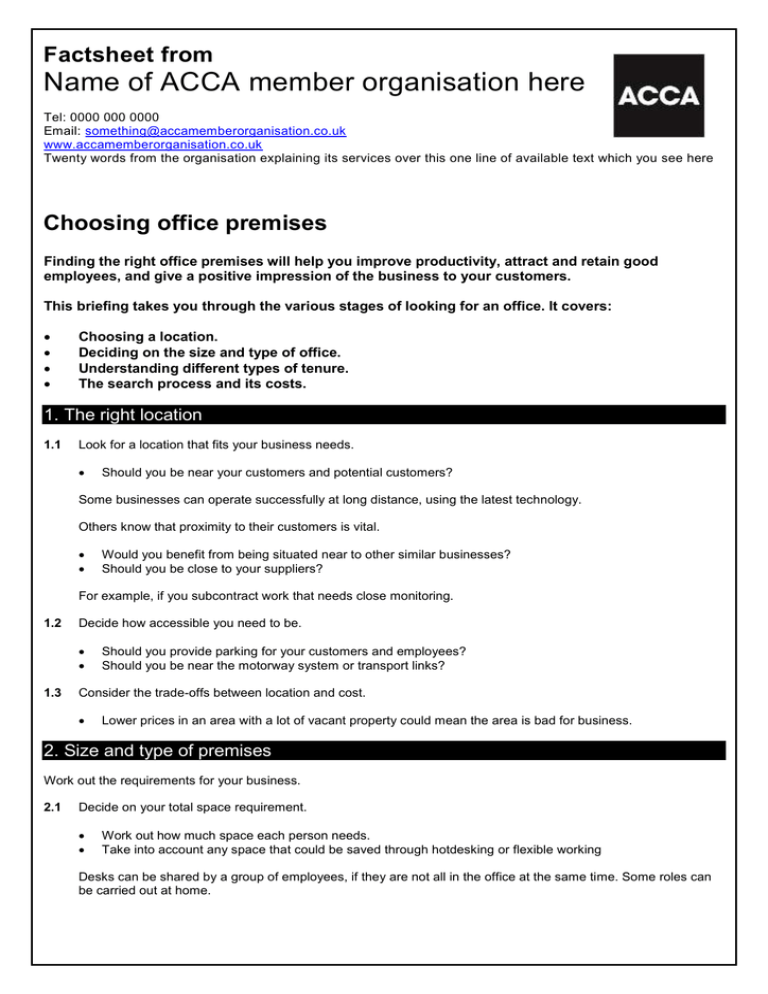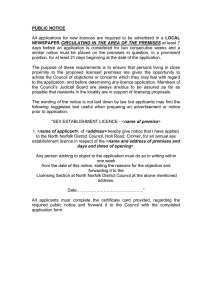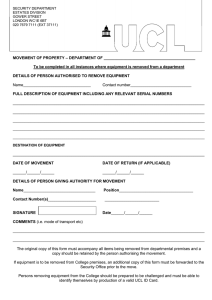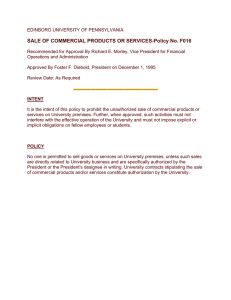
Factsheet from
Name of ACCA member organisation here
Tel: 0000 000 0000
Email: something@accamemberorganisation.co.uk
www.accamemberorganisation.co.uk
Twenty words from the organisation explaining its services over this one line of available text which you see here
Choosing office premises
Finding the right office premises will help you improve productivity, attract and retain good
employees, and give a positive impression of the business to your customers.
This briefing takes you through the various stages of looking for an office. It covers:
Choosing a location.
Deciding on the size and type of office.
Understanding different types of tenure.
The search process and its costs.
1. The right location
1.1
Look for a location that fits your business needs.
Should you be near your customers and potential customers?
Some businesses can operate successfully at long distance, using the latest technology.
Others know that proximity to their customers is vital.
Would you benefit from being situated near to other similar businesses?
Should you be close to your suppliers?
For example, if you subcontract work that needs close monitoring.
1.2
Decide how accessible you need to be.
1.3
Should you provide parking for your customers and employees?
Should you be near the motorway system or transport links?
Consider the trade-offs between location and cost.
Lower prices in an area with a lot of vacant property could mean the area is bad for business.
2. Size and type of premises
Work out the requirements for your business.
2.1
Decide on your total space requirement.
Work out how much space each person needs.
Take into account any space that could be saved through hotdesking or flexible working
Desks can be shared by a group of employees, if they are not all in the office at the same time. Some roles can
be carried out at home.
2.2
Decide on the type of layout you want.
2.3
Decide what additional space will be needed for meetings and storage.
Regular rectangular floors with a minimum number of pillars provide the maximum amount of usable space.
Open-plan space is more flexible, since you can divide or reorganise the space as your needs change.
Individual rooms offer privacy and are quieter.
Decide what your technical needs will be.
Consider modern buildings with air conditioning, cabling ducts and good security systems built in.
Consider how much natural light comes into the building.
Dark offices lead to more sickness and low productivity. Money saved by renting a basement office may be a
false economy.
Make sure the services are adequate.
For example, power points and phone sockets wherever they are needed, and a good broadband connection.
2.4
Look for premises which will allow you to expand or contract.
Going into a serviced office block may allow you to shift from one office to another, while keeping the same
address.
This reduces relocation costs and the disruption of moving.
Consider whether the nature of your business may change, so that you need another kind of premises.
Do all your operations need to be under one roof?
Many businesses underestimate how quickly they will outgrow their premises.
2.5
Decide what image you need to project.
A large, clearly visible office may add to your prestige.
Consider the advantages of perceived size.
The ‘Saatchi building’ was occupied by many companies other than the advertising firm, but the impression was
given that Saatchi & Saatchi occupied all of it.
If you initially sublet part of your office, you have the potential to expand in due course.
3. Town centre premises
A town centre may seem an obvious choice of location but there are pros and cons.
3.1
Town centres offer several advantages.
You can increase your visibility to your potential market.
A good address may be important.
You will probably have good access to public transport.
You will be close to facilities such as a post office, banks and print shops.
Employees may be attracted by a choice of eating, shopping and leisure facilities.
Businesses which usually prefer town centre locations include retailers, employment agencies and professional
firms.
3.2
There are also potential disadvantages.
2
Car parking may be difficult and expensive, for both employees and visitors.
Access for deliveries may be restricted.
Noise and pollution may be worse.
There may be less modern office space.
4. Out-of-town premises
Many new office developments have been built away from towns.
4.1
The advantages can be substantial.
There is usually plentiful parking.
Some employees place a high premium on being able to drive to work.
Business parks generally have modern, well-equipped office space.
The environment will be cleaner, more attractive and usually safer.
Businesses which often prefer out-of-town offices include sales operations, manufacturing businesses and call
centres.
4.2
The disadvantages are less obvious.
Estate maintenance and management charges in a business park can be surprisingly high.
Some business parks are located in run-down former industrial areas. Your employees and customers may
find this off-putting.
Employees without cars may find getting to work difficult.
There may be few shops or places to eat nearby.
With fewer places to socialise locally, employees may not spend much time together outside working hours.
5. License, lease or buy?
Buying premises is usually a long-term investment. A lease is a rental agreement, usually over several years. A licence
is a rental agreement on a more temporary basis.
All kinds of buildings can be bought or leased. The premises available on a licence are mainly offices, studios or
workshops suitable for smaller businesses.
5.1
What services and facilities do you need?
Licensed premises often give you access to shared office facilities, such as copying machines, on a pay-asyou-go basis.
Secretarial and switchboard services may be available, if required.
Meeting rooms or extra offices can often be hired by the hour, half-day or day.
5.2
Premises that are bought or leased do not usually offer day-to-day support services, nor the opportunity to
use communal facilities for special projects.
How much flexibility will your business need?
New or small businesses may prefer the easy-in, easy-out nature of a licence agreement.
You can usually terminate a licence agreement at a month’s notice.
3
Your landlord can also give just one month’s warning, but is unlikely to want to move you out if you are a good
tenant.
Leasing gives you security of tenure for the term of the lease, which is generally between three and 25 years.
You should be able to negotiate a break clause that gives you an option to end the lease at, say, five-year
intervals.
Without a break clause, you might be left paying the rent many years after your business ceased to use the
premises.
In theory, buying gives you complete control over when you move out.
In practice, this will be subject to market conditions and your ability to find a buyer for the property.
If you no longer need the premises for your business, but cannot sell the property, you have the option to
become a landlord and lease or license space to other businesses.
5.3
How much cash is available?
With minimal legal fees (if any) and only a small deposit to pay, taking premises on a licence is usually the
cheapest way to set up an office in the short term.
Licence terms vary, but typically you will have to find a month’s rent as a deposit and pay your rent monthly, or
quarterly, in advance.
Local authorities and enterprise agencies often subsidise rents in licensed office space, as one of their policies to
encourage small businesses and start-ups.
Rents on leases are usually paid quarterly in advance. You may also have to pay a deposit of, say, six
months’ rent.
Most leases include provisions for rent reviews at fixed periods.
Reviews can be a problem. In a rising market, your rent may increase considerably.
If you take a lease and rents start to fall, you may be stuck paying above market rates for several years.
Buying ties up your money for a long time, especially as deposits for commercial property mortgages can be
as high as 50 per cent.
Few businesses buy office premises unless they have large amounts of spare cash and are looking for a longterm investment.
Buying is obviously the most expensive option in the short term.
But it usually works out less expensive than paying rent after the first ten years and you do own the premises
once any mortgage is paid off.
5.4
How much liability will you have for repair and maintenance?
Licensed space will be maintained and repaired by the landlord.
If you lease, the landlord is usually responsible for external repairs and maintenance, and for any common
areas.
You may be responsible for internal repair and maintenance work.
If you buy the premises, you are responsible for all the repairs and maintenance.
Removing your alterations may involve extensive reinstatement such as replacing damaged ceilings.
4
6. Searching for premises
Searching for new premises will add significantly to your workload.
If the reason behind the relocation is the sudden growth or decline of your business, you will already be extremely busy
so it may be wise to hire a professional (see 6.3) to help you.
6.1
Make the most of personal contacts, especially people who have offices in the area you are interested in.
6.2
Visit several commercial agents who are active in the area you have chosen.
6.3
You may be able to share premises.
Another business may have space to sublet.
You may hear of suitable premises that have not yet come onto the market.
Question them about the state of the market and any new developments.
Ask for printed specifications of different premises to be sent to you.
When comparing different premises, use the total cost per square metre (including annual charges) as a
benchmark.
Consider hiring a chartered surveyor.
They will know the market and what is available.
They are experienced in negotiating the price and terms of a contract, taking commercial factors into
account.
They will protect your best interests, unlike commercial agents, who work for the landlord or seller.
A surveyor can view several premises before recommending a shortlist to you.
Visit www.rics.org/business or call 0870 333 1600 to access the RICS database of chartered surveyors.
6.4
Make contact with local businesses and organisations to ask for advice. For example:
6.5
Your local authority's economic development department.
Your local Chambers of Commerce or members of your professional association.
Read publications such as Estates Gazette, the property pages of broadsheet newspapers and specialist
websites.
There are regular surveys of specific areas. Ask the publication for the most recent survey on the area you
are interested in.
Local newspapers, Dalton’s Weekly and Daltonsbusiness.com carry many advertisements for small business
premises that do not appear elsewhere.
Fully involve your professional advisers before committing to any kind of legal agreement.
Depending on the circumstances, there may be a need for a structural survey, legal due diligence, and much
more.
Setting a brief
When searching for office premises, compile a list of criteria that the premises should meet. Then give each element a
score out of ten when you visit each property. Your list might include:
Cost, size and location.
Structural condition.
Maintenance liabilities.
Tenure.
Accessibility and parking.
Layout.
5
Front elevation and reception appearance.
Security.
Surroundings.
Lighting (electric and natural).
Experts’ quotes
“Considering the benefits to employees is particularly important when deciding whether to take out-of-town offices.”
Michael Langley, Michael Langley & Partners
The property industry has produced a code of practice for tenants and landlords in England and Wales to follow when
negotiating commercial leases. To download a pdf version, visit
http://www.bpf.org.uk/en/files/bpf_documents/commercial/full_suite.pdf
Last updated 01.06.11
© Atom Content Marketing 2011. ISSN 1369-1996. All rights reserved. No part of this publication may be reproduced or transmitted without the
written permission of the publisher. This publication is for general guidance only. The publisher, expert contributors and distributor disclaim all liability
for any errors or omissions. Consult your local business support organisation or your professional adviser for help and advice.
6





